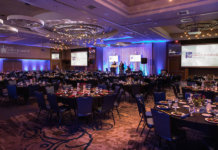![[Event] When the World of Family Business Comes to Vermont event-when-the-world-of-family-business-comes-to-vermont](https://www.tharawat-magazine.com/wp-content/uploads/2015/01/https:__www.tharawat-magazine.com_images_WebStories_2015_FECC2015_Fecc2015_2-696x464.jpg)
Burlington, Vermont, a small city perched in the northeastern part of the United States, is slowly making a name for itself in the world of Family Business, mainly thanks to the University of Vermont, School of Business Administration’s (UVM) hosting of the Family Enterprise Case Competition (FECC). For the third year in a row, FECC has inspired competitors from across the globe to journey to the land of ice and maple syrup. From January 7th to 10th, teams filled the UVM campus and Hilton hotel in downtown Burlington to take part in the world’s only student case competition based around family business. “It was the most meaningful experience in my academic career,” said Vikas Kotha, a participant from St. Bonaventure, “(the experience) was so valuable for me to have as I developed skills to work in my global family business.”
The competition consisted of three rounds in which all 24 teams were given family business cases to consider, and then presented their findings to a panel of judges. Once these rounds were scored, the winners from each division moved onto the final round, in which they analysed the case, “Plymouth Tube Company: How to Build Ownership Consensus,” to an open and energetic audience in the conference room of the Hilton Hotel. This case, in addition to the other three cases, was selected through the FECC 15 Case Writing Competition. The winning cases came from Pakistan, the USA, and India.
Of the 24 competing teams, the undergraduate finalists were Carleton University – Sprott School of Business, Dalhousie University, Universidad del Desarrolo, and Wilfrid Laurier University. The Graduate finalists were Indian School of Business, and Jönköping International Business School. After a hard fought week in which every team performed admirably, Sprott School of Business and Jönköping International Business School emerged victorious.
While the days were packed with preparation and presentation, the nights brought the different teams together for various events aimed at encouraging networking on a professional, social, and cultural level. As Hashim Larry, a graduate student competitor from Esade University in Barcelona stated, “It’s an amazing experience overall. It’s fantastic. We’ve been interacting with people from different schools, different places all over the world with different experiences in family business.”
While the long-lasting and significant connections made by all those involved in FECC are important, equally essential are the ideas and values that drive FECC in the first place. Although there are many student business case competitions throughout the world, FECC is the only one that focuses on the family business discipline. This is actually surprising, given the quantity and impact that family businesses continue to have on the global economy.
FECC had a strong showing of competitors who came from family business backgrounds. However, many did not. The fact that they still travelled across oceans and continents to compete in this celebration of family business, and may never even be a part of a family business, clearly indicates though that there is much interest about learning from these business models. Targeted education and awareness must be encouraged in both the classroom and the workplace. The Family Enterprise Case Competition is taking fantastic strides to accomplish this, guaranteeing a strong future for family business.









